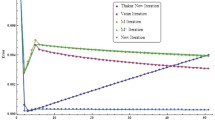Abstract
The convergence of a Dinkelbach-type algorithm in generalized fractional programming is obtained by considering the sensitivity of a parametrized problem. We show that the rate of convergence is at least equal to (1+√5)/2 when regularity conditions hold in a neighbourhood of the optimal solution. We give also a necessary and sufficient condition for the convergence to be quadratic (which will be verified in particular in the linear case) and an idea of its implementation in the convex case.
Zusammenfassung
Die Konvergenz eines Verfahrens i. S. von Dinkelbach zur Lösung verallgemeinerter Quotientenprogramme wird durch Untersuchung der Sensitivität eines parametrisierten Problems abgeleitet. Es wird gezeigt, daß die Konvergenzrate durch (1+√5)/2 nach unten beschränkt ist, falls gewisse Regularitätsbedingungen in einer Umgebung der Optimallösung erfüllt sind. Ferner wird eine notwendige und hinreichende Bedingung zur quadratischen Konvergenz hergeleitet. Es wird gezeigt, wie diese im Falle konvexer Probleme implementiert werden kann.
Similar content being viewed by others
References
Barrodale I, Powell MJD, Roberts FDK (1972) The differential correction algorithm for rationall ∞-approximation. SIAM J Numerical Analysis 9:493–504
Borde J (1985) Quelques aspects théoriques et algorithmiques en quasi-convexité. Thèse de 3ème Cycle, Université de Clermont-Ferrand II
Chabrillac Y (1982) Semi-définie positivité de formes quadratiques sur un sous-espace. Fonctions monotones dansRn. Thèse de 3ème Cycle, Université de Clermont-Ferrand II
Charnes A, Cooper WW (1962) Programming with linear fractional functionals. Naval Research Logistics Quarterly 9:181–186
Cornet B, Vial JPh (0000) Lipschitzian solutions of perturbed nonlinear programming problems. Mathematical Programming Study (to appear)
Crouzeix J-P, Ferland JA, Schaible S (1983) Duality in generalized linear fractional programming. Mathematical Programming 27:342–354
Crouzeix J-P, Ferland JA, Schaible S (1985) An algorithm for generalized fractional programs. Journal of Optimization Theory and Applications 47:35–49
Crouzeix J-P, Ferland JA, Schaible S (1986) A note on an algorithm for generalized fractional programs. Journal of Optimization Theory and Applications 50:183–187
Dinkelbach W (1967) On non-linear fractional programming. Management Science 13:492–498
Ferland JA, Potvin JY (1985) Generalized fractional programming: algorithms and numerical experimentation. European Journal of Operational Research 20:92–101
Fiacco AV (1976) Sensitivity analysis for nonlinear programming using penalty methods. Mathematical Programming 10:287–311
Flachs J (1985) Generalized Cheney-Loeb-Dinkelbach-Type algorithms. Mathematics of Operations Research 10:674–687
Haynsworth EV (1968) Determination of the inertia of a partitioned hermitian matrix. Linear Algebra and its Applications 1:73–81
Hiriart-Urruty J-B (1979) Tangent cones, generalized gradients and mathematical programming in Banach spaces. Mathematics of Operations Research 4:79–97
Ibaraki T (1982) Solving mathematical programs with fractional objective functions. In: Schaible S, Ziemba WT (eds) Generalized concavity in optimization and economics. Academic Press, pp 441–472
Ibaraki T, Schaible S (1983) Invited review: fractional programming. European Journal of Operational Research 12:325–338
Isbell JR, Marlow WH (1956) Attrition games. Naval Research Logistics Quarterly 3:71–93
Rabinowitz-Ralston (1981) A first course in numerical analysis. McGraw-Hill, New York
Schaible S (1976) Fractional programming-II, on Dinkelbach's algorithm. Management Science 22:868–873
Schaible S (1978) Analyse and Anwendungen von Quotientenprogrammen. Verlag Anton Hain, Meisenheim am Glan
Schaible S (1981) Fractional programming: applications and algorithms. European Journal of Operational Research 7:111–120
Schaible S (1982) Bibliography in fractional programming. Zeitschrift für Operations Research 26:211–241
Von Neumann J (1945) A model of general economic equilibrium. Rev Econom Studies 13:1–9
Author information
Authors and Affiliations
Rights and permissions
About this article
Cite this article
Borde, J., Crouzeix, J.P. Convergence of a Dinkelbach-type algorithm in generalized fractional programming. Zeitschrift für Operations Research 31, A31–A54 (1987). https://doi.org/10.1007/BF01258607
Received:
Revised:
Issue Date:
DOI: https://doi.org/10.1007/BF01258607



